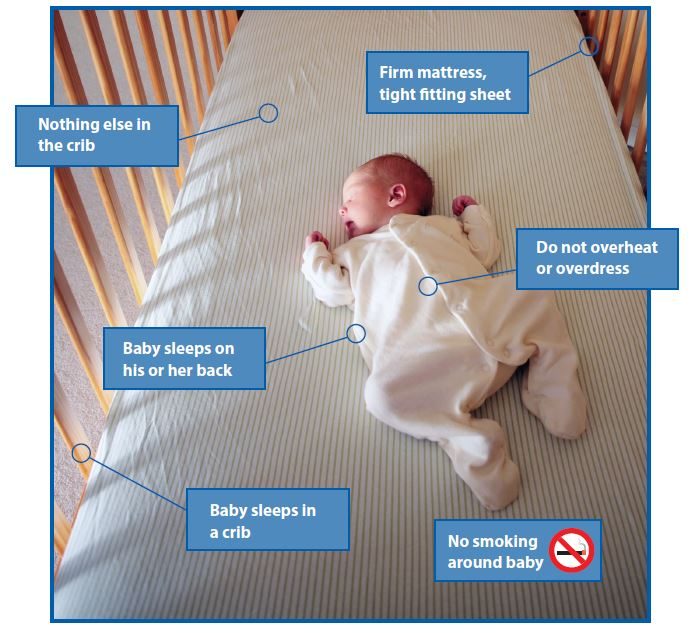Babies may pass away in their sleep due to sudden infant death syndrome (SIDS), a condition that can occur without any warning signs or symptoms. SIDS is often attributed to an abnormality in the part of the brain that controls breathing and arousal from sleep, leading to respiratory failure.
Losing a baby to SIDS is a devastating and unexpected tragedy for families. While the exact cause of SIDS is still unknown, there are steps parents can take to reduce the risk, such as placing babies on their backs to sleep, keeping their sleeping environment free from hazards, and avoiding exposure to tobacco smoke.
Understanding the risk factors and promoting safe sleep practices are crucial in helping to prevent SIDS and ensuring the well-being of infants. By raising awareness and following recommended guidelines, we can work towards reducing the occurrence of this heartbreaking loss.
Understanding Sudden Infant Death Syndrome
Sudden Infant Death Syndrome (SIDS) is a tragic occurrence where babies pass away in their sleep. Understanding the reasons behind SIDS is crucial for parents to take necessary precautions and ensure the safety of their little ones during sleep.
Understanding Sudden Infant Death Syndrome Babies are a source of joy and wonder, but the tragic reality is that some babies pass away in their sleep due to a phenomenon known as Sudden Infant Death Syndrome (SIDS).
It’s a devastating and inexplicable event that can occur seemingly without warning, leaving families bewildered and heartbroken.
When a baby dies unexpectedly and without a clear cause, it’s often attributed to SIDS. Understanding the risk factors and possible causes of Sudden Infant Death Syndrome is crucial for preventing future tragedies.
Risk Factors SIDS does not discriminate and can affect any baby, but certain risk factors increase the likelihood of its occurrence.
Smoking during pregnancy, prenatal drug and alcohol exposure, and overheating during sleep are risk factors that can contribute to SIDS. Additionally, premature birth, low birth weight, and a family history of SIDS can also elevate the risk.
Possible Causes While the exact cause of Sudden Infant Death Syndrome remains unknown, there are several theories about what might contribute to its occurrence.
Brain abnormalities, respiratory infections, and problems with the part of the brain that controls breathing and arousal from sleep have all been proposed as possible causes of SIDS.
Furthermore, experts believe that a combination of factors, such as genetic vulnerabilities and environmental stressors, may increase the risk of SIDS.
By understanding the risk factors and possible causes of Sudden Infant Death Syndrome, parents and caregivers can take proactive measures to reduce the risk and ensure the safety of sleeping infants.
Signs And Symptoms, babies pass away in their sleep
Babies passing away in their sleep can be attributed to a range of factors. Common signs and symptoms include sudden infant death syndrome (SIDS), breathing irregularities, and respiratory infections, as well as issues with the central nervous system. It’s crucial for parents to monitor their baby’s health and seek medical attention if any concerning symptoms arise.
Subtle Indicators
In some cases, babies may exhibit subtle indicators that something is amiss while they sleep. It’s crucial for parents and caregivers to be aware of these signs so that prompt action can be taken. By keeping a watchful eye, you may be able to detect any potential issues early on and prevent tragic outcomes. Some of the subtle indicators to look out for include:
- Changes in breathing patterns: Observe if your baby’s breathing is irregular, shallow, or seems to pause intermittently. These could be signs of trouble.
- Unusual sleep patterns: Pay attention to any sudden changes in your baby’s sleep routine. If they start having difficulty falling asleep or waking up frequently during the night, it may be worth investigating further.
- Excessive sweating or dampness: Excessive sweating or dampness on the baby’s body, particularly on the head, could indicate that something is not right.
- Changes in skin color: Take note if your baby’s lips, face, or extremities appear dusky or pale. These changes in skin color could indicate a lack of oxygen.
- Unresponsiveness: If your baby doesn’t respond to your touch, sounds, or gentle movements, it might be cause for concern.
What To Look Out For
To ensure the safety of your baby, here are some additional signs and symptoms to watch for:
- Blue or purplish tint to the skin
- Difficulty waking up completely
- Unexplained fever
- Chronic coughing or wheezing
- Choking or gagging during sleep
- Excessive fussiness or irritability
- Inconsolable crying or difficulty being comforted
It’s important to note that these signs and symptoms alone may not directly indicate a life-threatening situation. However, if you notice any of these indicators or a combination of them, do not hesitate to seek medical attention.
Remember, being vigilant and knowing what to look out for can make all the difference in ensuring your baby’s well-being.
Preventive Measures
Babies passing away in their sleep is a tragic and devastating occurrence that no parent wants to experience. However, by implementing preventive measures, it is possible to reduce the risk of such incidents. Here are some important steps you can take to ensure your baby sleeps safely and reduce the chances of sudden infant death syndrome (SIDS).
Safe Sleeping Practices
Creating a safe sleeping environment for your baby is crucial in preventing sleep-related accidents. Follow these safe sleeping practices:
- Always place your baby on their back to sleep, whether it’s for a nap or at nighttime.
- Ensure your baby’s sleep surface is firm and flat, and free from any soft bedding or pillows that could pose a suffocation hazard.
- Use a fitted sheet that tightly covers the mattress, and avoid using blankets or loose bedding that could cover your baby’s face.
- Keep the room temperature at a comfortable level, ideally between 68°F and 72°F (20°C and 22.2°C), to prevent overheating.
Regular Doctor Visits
Regular visits to your baby’s doctor are essential for monitoring their growth and development, as well as addressing any concerns you may have. These doctor visits play an important role in preventing infant sleep-related fatalities. Here’s what you need to know:
- Ensure your baby receives all recommended vaccinations according to the schedule provided by the doctor.
- Discuss safe sleeping practices with your doctor and seek their guidance on any specific concerns or questions you may have.
- Diligently adhere to the guidance and advice given by your baby’s doctor regarding your baby’s health and well-being.
By prioritizing safe sleeping practices and regular doctor visits, you can significantly reduce the risk of sleep-related accidents and promote the overall well-being of your baby.
Support For Grieving Families
Losing a baby is an incredibly painful experience for any family. Coping with the passing of an infant can be overwhelming, and families often need support to navigate through their grief. During this tough period, it is crucial for grieving families to understand the coping mechanisms and seek professional help to process their emotions in a healthy manner.
Coping Mechanisms
Grieving families can utilize coping mechanisms to help them navigate through their loss. Each family member may have different methods for coping, so it’s important for them to communicate and support one another. Some effective coping mechanisms include:
- Open communication within the family
- Seeking support from friends and other loved ones
- Participating in support groups and counseling
Seeking Professional Help
In some instances, seeking professional help is essential for families to process their grief. Professional guidance can provide the necessary support and tools for families to cope with their loss. Seek assistance from:
- Grief counselors or therapists
- Support groups specifically for bereaved parents
- Consultation with healthcare professionals for emotional support
Research And Advancements
Research and advancements in the field of understanding how babies pass away in their sleep have led to significant progress in unraveling the mysteries surrounding this tragic phenomenon.
Current Studies On Sids
Ongoing studies are shedding light on Sudden Infant Death Syndrome (SIDS), helping researchers pinpoint potential causes and risk factors involved. The focus is on preventing sudden and unexplained infant deaths.
Technological Innovations3
Technological advancements have revolutionized the monitoring of infants during sleep, with devices such as smart baby monitors capable of detecting irregular breathing patterns or changes in heart rate.

Raising Awareness
Babies passing away in their sleep is a heartbreaking reality that many families face. By raising awareness about safe sleep practices and risk factors, we aim to prevent such tragedies.
Educational Campaigns
Educational Campaigns play a crucial role in spreading information about safe sleep practices for babies. With interactive materials and online resources, parents can learn to create a safe sleep environment.
Community Initiatives
Community Initiatives involve local organizations and health professionals in promoting safe sleep practices. Through workshops, seminars, and distribution of educational materials, awareness can be raised within communities.
Are There Warning Signs For Sids?
Yes, potential warning signs for SIDS include sleeping on the stomach, maternal smoking, and overheating. It’s crucial to follow safe sleep practices for infants.
What Is The Unexplained Death Of An Infant Usually During Sleep?
Sudden Infant Death Syndrome (SIDS) is the unexplained death of an infant during sleep.
What Causes A Baby To Pass Away?
Babies may pass away due to various factors like birth defects, premature birth, infections, suffocation, accidents, and health complications.
How Old Can A Baby Pass Away From Sids?
Babies can pass away from SIDS typically between one month and one year of age.
Conclusion
In our blog post, we’ve explored the potential causes of sudden infant death syndrome (SIDS) and discussed the importance of creating a safe sleep environment for babies. By understanding the risk factors and implementing precautions, we can work towards reducing the occurrences and raising awareness about SIDS.
It’s crucial to prioritize a safe sleep routine to protect our little ones.





